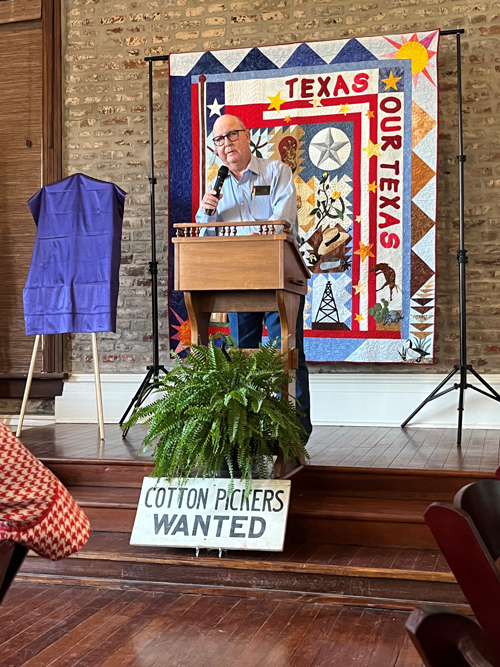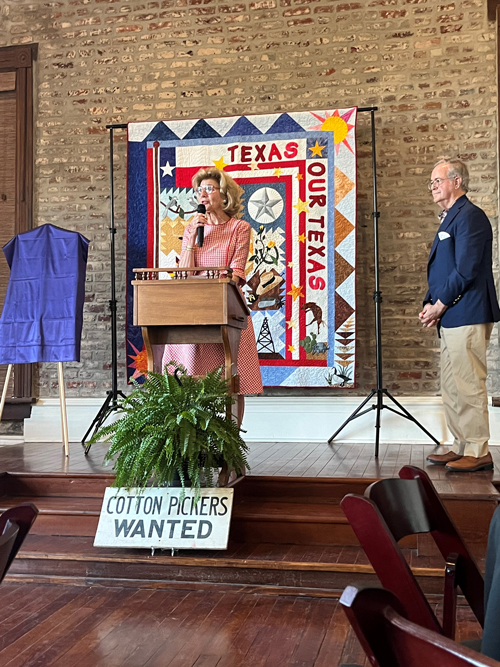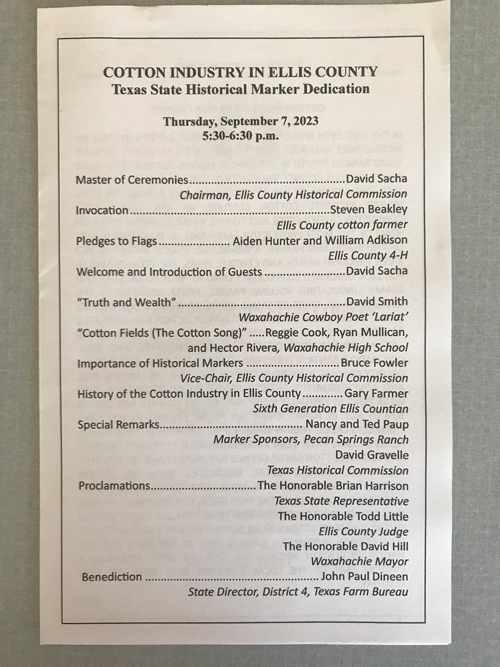Ellis County receives Texas State Historical Marker for its cotton industry.
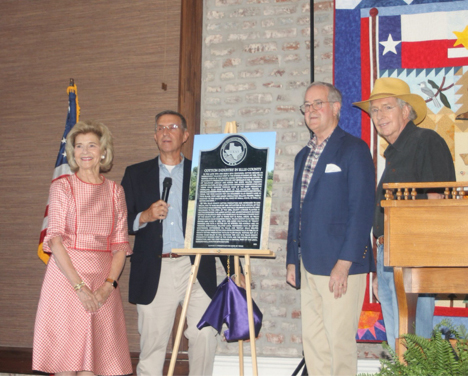
September 13, 2023in News-Waxahachie Daily Light
Chris Roark, croark@cherryroad.com
The cotton industry played a significant role in the development and prosperity of Ellis County since it was formed in the mid-1800s.
Thursday the community gathered to celebrate a state honor that recognizes that history.
The Ellis County Historical Commission hosted a dedication ceremony at 1889 on the Square, the new special events venue inside the Ellis County Museum, to celebrate a Texas State Historical Marker given to the county by the Texas Historical Commission (THC).
David Gravelle, who serves on the Texas Historical Commission, said one of the goals of the commission is to honor industries that sparked business growth and development early in the state’s history.
“In Ellis County it was cotton,” Gravelle said. “Cotton was huge in Ellis County.
“One reason Waxahachie and Ennis prospered was because of the cotton industry,” Gravelle said. “It essentially built those towns.”
The marker is located at Pecan Springs Ranch, 1900 L.R. Campbell Road (FM 876) in Italy.
Owners of the property Nancy and Ted Paup attended the ceremony. This is the third Texas Historical Marker on the family’s property. Markers have also been placed there to signify the Shawnee Cattle Trail, which went from South Texas to Kansas through Ellis County, as well as Wilson Dabney Sims, who owned a cotton gin on his 2,800 acres of what is now Pecan Springs Ranch. He used the gin for his own use and for his tenants.
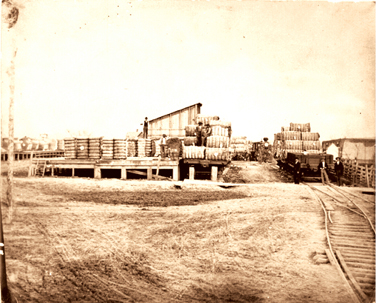
“It has been a privilege and honor to work personally with the Ellis County Historical Commission on three Texas State Historical Commission Markers over the past few years, including the Cotton Industry In Ellis County,” Nancy Paup said. “As owners of the Pecan Springs Ranch near Waxahachie, Ted and I are committed to the historical significance and preservation of the land. During the late 19th and early 20th centuries, the cotton industry played a prominent role in the economic development of Ellis County.”
The cotton industry’s history
Farmer and rancher Gary Farmer, a sixth-generation resident of Ellis County, provided a history of the cotton industry in the county at the ceremony.
He said in 1852, just three years after the county was formed, Texas was the eighth-largest cotton-producing state in the country.
Farmer said production dipped during the Civil War, but the invention of barbed wire and the construction of railroads helped spark the industry again in the 1870s.
Farmer said despite the state’s large cotton production and Ellis County being located within the rich, dark soil of the Blackland Prairie, it wasn’t cotton but rather small-grain production – corn, wheat and livestock – that was predominant in Ellis County at the time.
“The problem wasn’t the soil but the prohibitive costs of transportation,” Farmer said.
But he said the opening of the Houston Texas Central Railroad on the east side of Ellis County in 1871 and the Gulf, Colorado & Santa Fe Railway on the county’s west side in 1882 opened up transportation opportunities.
As a result, Farmer said the amount of cotton Ellis County produced went from 359 bales in 1860 to 2,960 bales in 1870 and 18,956 bales in 1880.
In fact, the amount of amount cotton planted by 1890 had surpassed the labor supply, so a group of Waxahachie residents began a campaign to draw in immigrants from other states to work in the cotton fields, Farmer said.
“The response was overwhelming,” Farmer said. “Hundreds of families moved to the county during the early 1890s as a result of the advertising scheme, including several in my own family, and took up tenant and sharecrop farming reinforcing the move in Ellis County toward the exclusive production of cotton.”
Farmer said landowners who leased their land would furnish the house, firewood team and implements, and the tenant would receive one-half of the crop.
“I well remember my grandfather telling me this is how he got started farming in the 1930s … sharecropping on the halves,” Farmer said. “On the other hand when the tenant furnished the teams and implements the landlord had one-fourth the cotton and one-third of the wheat and corn. One hundred forty years later, farmers still follow much the same system. The equipment is just a bit more advanced.”
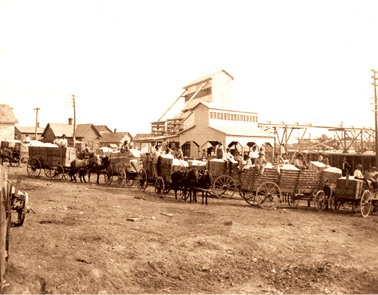
Farmer said technological advancements helped expand cotton production in Ellis County over the years. Those included mechanical feeders that automatically fed the seed cotton into gin stands, new condensers to shape the cotton into bales, more efficient compact presses and handling devices for unloading seed cotton from the wagon.
Farmer said by 1880 there were 25 new cotton gins built in Ellis County and more than 30 by 1901, both in larger towns and more rural areas. He said by 1920 Ellis County led the state in operating cotton gins.
Farmer said the county produced 187,449 bales of cotton in 1912, earning it the distinction of “the greatest cotton producing county in the world,” according to the 1912 “Texas Almanac and State Industrial Guide.” Between 1895 and 1915 Ellis County frequently ranked first in the state and the country in cotton production.
“While tenancy and sharecropping spread across the county with the influx of immigrants between 1890 and 1920 these men and their families led hard, subsistent lives farming and raising cotton on rented land,” Farmer said. “I grew up listening to stories about how hard life was for my ancestors as sharecroppers. It was the enterprising landowners, however, that became most profitable, and they ushered in an age of prosperity spurred by the wealth from abundant cotton crops.”
Farmer said the cotton industry led to the creation of other companies in Ellis County, including the Waxahachie Cotton Mill, which was built in 1901. One of the largest cotton mills in Texas it used home-grown cotton and produced 7,500 yards of sheeting or ducking a day and had 10,000 spindles and 200 looms at its peak, Farmer said. Mill Village, which included 24 small-frame houses, a church, a school and an electrical generating plant, was created just south of the cotton mill.
Farmer said the residents of Ellis County were proud of their standing as a leader in the cotton industry, and in 1924 residents gathered at Getzendaner Park to hold the county’s first King Cotton Pageant. It took place into the 1960s with the Ellis County Cotton Festival, Farmer said.
But Farmer said the cotton farming industry began to decline in the 1930s in part because farmers ignored warnings that crop rotation and diversification were important in the development of agriculture in the future. The Great Depression also slowed cotton demand. He said cotton production in Ellis County dropped from 97,000 bales in 1930 to 67,000 in 1950.
Still, Farmer said, the cotton industry sparked prosperity that led to a construction boom in Ellis County. Schools, churches, banks, businesses, roads, bridges and the Ellis County Courthouse were all built as a result of that economic growth.
Farmer concluded by recognizing those in the audience who are or are related to someone involved in the cotton production industry.
“Thank you for helping make Ellis County history,” Farmer said.
Deep history
Pecan Springs Ranch is just one of the many historical markers in Ellis County and the state.
According to Gravelle there are 128 historical markers in Ellis County, which ranks Texas 37th in the state.
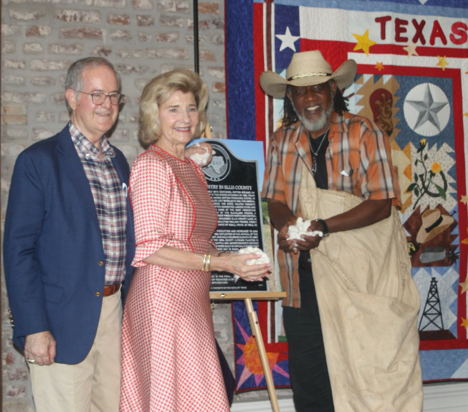
Gravelle said there are also 122 listings in the National Register of Historic Places in Ellis County.
He said there are 37 recorded Texas historic landmarks in Ellis County.
Bruce Fowler, vice chairman of the Ellis County Historical Commission, said it’s important to recognize the historic places and events in Ellis County.
“We’re just here for a while,” Fowler said. “But we can make the best decisions about our future if we learn about the past.”
Also at the ceremony, Waxahachie poet and lariat David Smith recited “Truth and Wealth,” a poem about the history and importance of the cotton industry in Ellis County.
Clarence Glover, a Dallas resident who grew up picking cotton and who later founded African American Cotton Pickers Day, also attended the ceremony to discuss the importance of the cotton farming industry.
The county also received proclamations from State Rep. Brian Harrison, County Judge Todd Little and Waxahachie Mayor David Hill.

